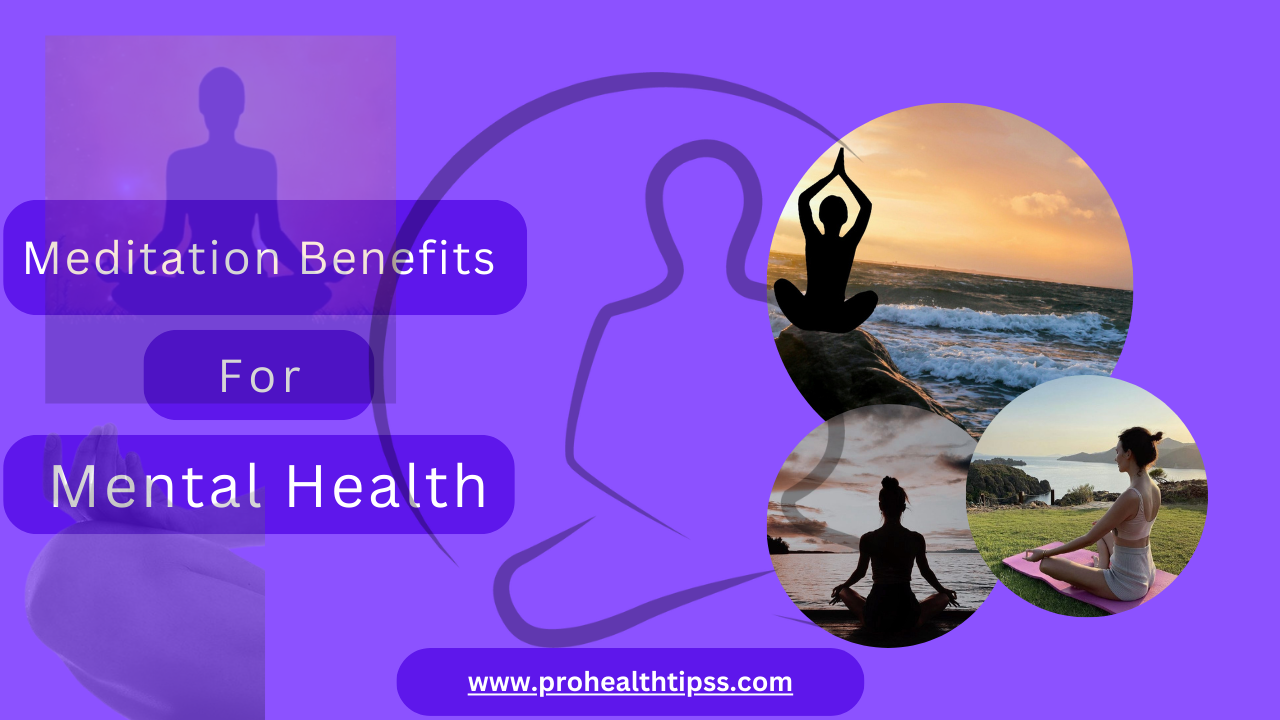Meditation Benefits for Mental Health
Meditation functions as a potent remedy for the mind, providing an array of advantages that contribute to enhanced mental well-being. As individuals embark on the path of mindfulness, the practice gently untangles the threads of stress, anxiety, and mental clutter. By engaging in focused breathing and heightened awareness, meditation becomes a haven where the mind discovers solace and renewal. Supported by scientific evidence demonstrating its ability to lower cortisol levels and improve emotional health, this age-old practice acts as a cognitive exercise, strengthening the faculties of attention and resilience. Regular meditation not only pacifies the turbulence of thoughts but also nurtures a deep sense of self-awareness, fostering a harmonious connection between the mind and the present moment.

What is Meditation?
Meditation is like a mental gym workout. It’s a practice where you train your mind to focus and be present in the moment. There are various techniques, but the common thread is cultivating mindfulness, relaxation, and awareness. It’s not about emptying your mind of thoughts; it’s more about observing them without getting too caught up. It’s like a spa day for your brain!
Benefits of Meditation
Meditation offers a myriad of benefits for both the mind and body. It serves as a powerful stress antidote, promoting relaxation and a sense of calm. With regular practice, meditation enhances concentration, fostering improved cognitive abilities. Emotionally, it contributes to greater self-awareness and stability, cultivating a positive outlook on life. Additionally, it can aid in achieving better sleep quality, strengthen the mind-body connection, and spark creativity by providing a mental reset. Incorporating meditation into your routine brings about holistic well-being, making it a valuable practice for a healthier and more balanced life.
What are the mental health benefits of meditation and mindfulness?
Meditation and mindfulness offer profound mental health benefits by providing tools to navigate the challenges of the mind. Regular practice has been linked to stress reduction, alleviating anxiety and depression symptoms. These techniques encourage present-moment awareness, fostering emotional resilience and a more positive outlook. Mindfulness, in particular, teaches acceptance and non-judgmental observation of thoughts, reducing rumination and enhancing overall psychological well-being. By cultivating a calm and centered mindset, meditation contributes to improved focus, better sleep, and a strengthened sense of self-awareness, making it a valuable ally in promoting mental health and emotional balance.
How do meditation and mindfulness work?
Some research suggests that meditation and mindfulness practices may affect the functioning or structure of the brain. Studies have used various methods of measuring brain activity to look for measurable differences in the brains of people engaged in mindfulness-based practices. Other studies have theorized that training in meditation and mindfulness practices can change brain activity.
Read More :-Meditation Benefits For Brain click here
7 Reasons to Meditate
- Stress Reduction: Meditation is renowned for its ability to alleviate stress. Taking a few minutes each day to focus on your breath and clear your mind can significantly reduce stress levels and promote a sense of calm.
- Improved Concentration: Regular meditation has been linked to enhanced concentration and attention span. It helps train your mind to stay focused on the present moment, leading to better cognitive performance.
- Enhanced Emotional Well-being: Meditation can contribute to a more positive outlook on life. It has been associated with increased self-awareness, emotional stability, and a greater sense of overall well-being.
- Better Sleep: The relaxation and mindfulness gained from meditation can promote better sleep quality. If you struggle with insomnia or have difficulty winding down at night, meditation can be a game-changer.
- Mind-Body Connection: Meditation emphasizes the connection between the mind and body. By tuning into your body’s sensations and being present, you can cultivate a greater awareness of your overall health and well-being.
- Increased Self-Awareness: Meditation encourages self-reflection and self-awareness. It allows you to observe your thoughts without judgment, fostering a deeper understanding of your emotions, behaviors, and reactions.
- Enhanced Creativity: Clearing the mind through meditation can create space for new ideas and perspectives to emerge.Many creatives and innovators swear by meditation as a tool for boosting creativity.
Listen meditation and relaxing music
PROHEALTHTIPSS Suggestion
Regular meditation has been linked to reduced stress, anxiety, and depressive symptoms. It acts as a mental reset button, fostering emotional resilience and a greater sense of self-awareness. The practice encourages a mindful approach to daily life, promoting better focus and cognitive function. It’s like a workout for your mind, helping to build mental strength and agility. So, if you’re navigating the rollercoaster of modern life, carving out a few minutes each day for meditation could be your ticket to a calmer, more centered mental state.
Conclusion
The practice serves as a potent ally in fostering emotional well-being by reducing stress, anxiety, and depressive symptoms. Through regular meditation, individuals can enhance their self-awareness, develop a greater sense of inner peace, and build resilience in the face of life’s challenges. Scientifically validated, meditation techniques have demonstrated their effectiveness in promoting positive changes in the brain, contributing to improved cognitive functions and emotional regulation. Embracing meditation as a part of one’s mental health regimen offers a holistic approach that empowers individuals to navigate the complexities of modern life with greater ease and mindfulness.



